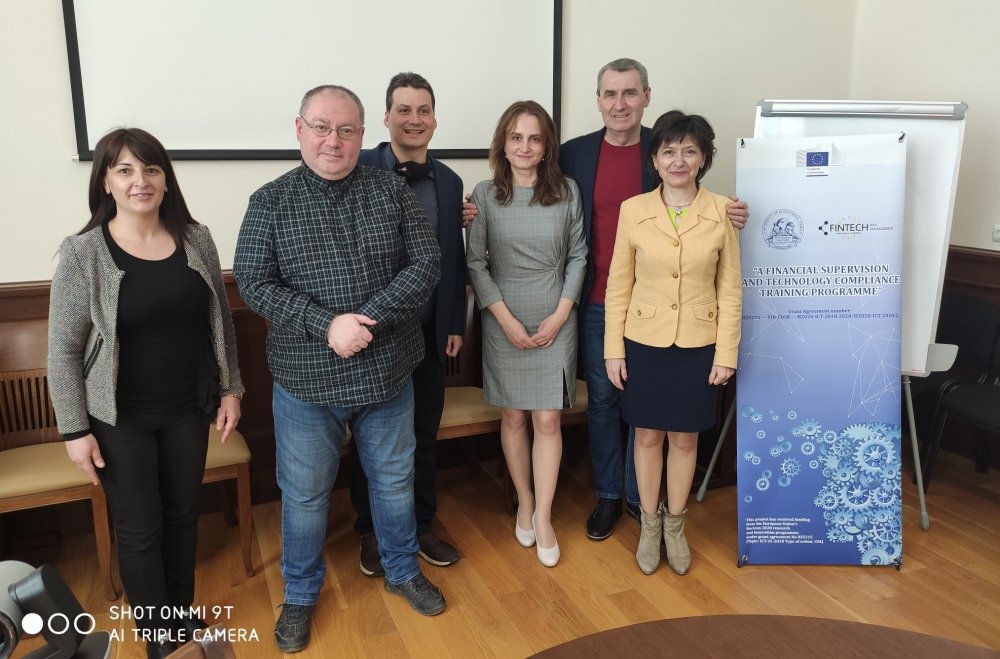
A two-day SUP-TECH forum for knowledge exchange between experts from the University of Economics - Varna, the Financial Supervision Commission, the Bulgarian Fintech Association and representatives of fintech companies in Bulgaria, dedicated to blockchain technology, was held online on April 15 and 16, 2021.
The event is the last of a total of three knowledge sharing sessions dedicated to the topics of big data (2019), artificial intelligence (2020), blockchain (2021). They all were held within the project FIN-TECH "A FINancial TECHnology supervision and compliance training programme", funded by HORIZON 2020, in which Bulgaria is represented by UE - Varna and FSC.
Together with the experts’ team of University of Economics - Varna - representatives of the departments "Finance", "Informatics" and "Statistics and Applied Mathematics", the speakers’ role was shared also with Georgi Penev - Chairman of the Bulgarian Fintech Association, Dimitar Ivanov - LimeChain, Stefan Blaginov - developer in Clause Inc. and others.
The extremely interesting program provoked discussions about the responsibility of all users in terms of maintaining collective control in a blockchain and application of blockchain technology in areas such as authentication, joint public registers and databases, blockchain- based bureaucracy in the context of Bulgaria, voting, logistics and retail chains, securities trading, trade finance, etc.
Since the blockchain technology is the heart of innovations such as "cryptocurrencies", "tokens", "secured stable currencies" and "digital currencies of central banks", the discussion highlighted the extremely complex and resource-intensive process, which is in fact even the most basic operation related, to cryptocurrencies. Scenarios where a "stablecoin" can function as a global digital currency being secured with any traditional currency, a currency basket or a combination of currencies and other assets, were considered. A method for constructing a stable currency based on currency basket and survey about which currencies lead to spread of instability to the rest ones in the basket was demonstrated.
Comparison of the characteristics of "encryption " and "tokenization" methods for protection of information, together with the utilization of blockchain technology when creating and issuance of digital tokens or "coins" representing shareholdings into a company’ capital as an innovative opportunity for capital raising, especially for start-up companies in the field of high technology, as well as the similarities and differences of tokenized securities against traditional securities, were presented to the attention of the audience.
The application of blockchain technology for regulatory purposes did not stay aside of the discussion. Clarity was brought on current regulatory initiatives, levels of regulation (national, European level or lack of regulations) in the field of fintech sectors, and the solutions used based on 37 large banking groups in the EU, according to a study of the European Banking Authority (2018).
Both forms of the regulatory function were mentionned: Reg -Tech ("Regulatory Technologies") - a collective term summarizing the application of high technology in order to comply with regulatory requirements and Sup-Tech ("Supervisory Technologies" - development and implementation of high-tech solutions for the needs of financial regulation and supervision.
Analysis of the cryptocurrency market through the application of various cluster techniques based on prototypes was the next topic for knowledge exchange and discussion. A cryptocurrency market analysis methodology based on a specific data mining methodology was presented in order to arrive at a good investment recommendation for specific cryptocurrencies and a portfolio theory that can help to allocate assets more efficiently.
The seminar was focused also on the topic of cyber risk - one of the most significant regulatory challenges in 2021, by demonstrating cyber risk management models, based on range scale and explainable artificial intelligence.
The final topic of the program was in the field of application of statistical tools and methods for analysis and classification of cryptocurrencies, as well as those of applied mathematics and machine learning.
22 Apr 2021